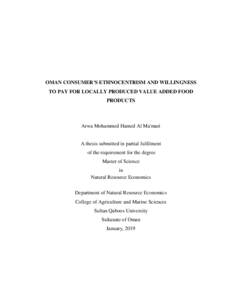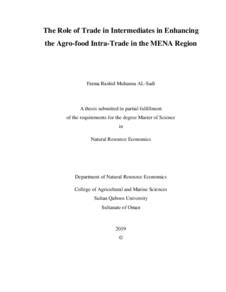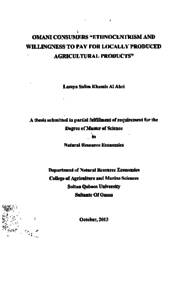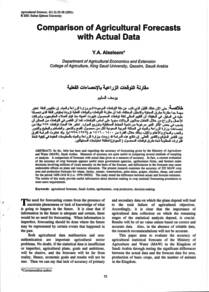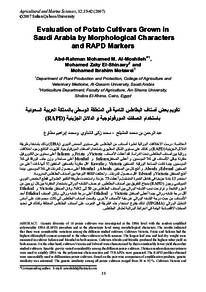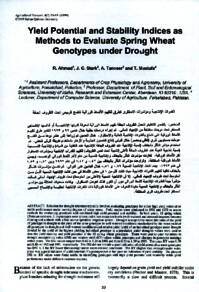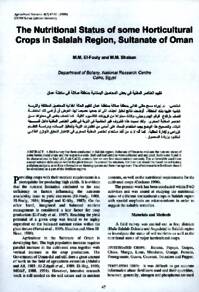وثيقة
Oman consumer's ethnocentrism and willingness to pay for locally produced value added food products
الناشر
Sultan Qaboos University
ميلادي
2019
اللغة
الأنجليزية
الملخص الإنجليزي
The Oman government is currently engaged in a comprehensive economic diversification strategy to reduce dependency on oil export. The Oman government diversification Strategies put emphasis on, among other things, sectors such as agriculture and fisheries to contribute to job creation, food security and the overall growth of the Oman economy. Under the diversification strategies, more emphasis is directed on expanding the agricultural sector's contribution to Oman Gross Domestic Product (GDP). The success of the diversification strategies by the Oman government would, among other things, depend on the success of the promotion of market demand for "locally produced value added products". Therefore, investigating and understanding consumer attitudes toward these products becomes important. This study does just that by investigating Omani consumers' ethnocentrism and their willingness to pay premium for locally-produced value added products. This was accomplished using CETSCALE, non- parametric test and Interval Regression techniques for ethnocentrism and willingness to pay respectively. Results indicate that Omani consumers are ethnocentric (CETSCALE mean value = 59.2 against standard average of 51), and overall, they have positive attitude towards locally produced value added food products. Omani consumers would buy locally produced value added products, instead of imported ones, when the price and quality of the locally produced value added products are as good as imported products. Furthermore, a majority of the consumers think that Omani locally produced products are not of poor quality. With regard to Willingness to Pay (WTP) for "Oman locally produced food product", consumer ethnocentrism, preference, gender, income, age, level of education and global consumption orientation were found to have effect on the willingness to pay. This study therefore, has come up with some very useful insights for businesses and the government.
المجموعة
URL المصدر
الملخص العربي
بدأت الحكومة العمانية في استراتيجية شاملة للتنويع الاقتصادي وتقليل الاعتماد على النفط ، وقد ركزت استراتيجية الحكومة للتنويع الاقتصادي في سلطنة عمان ، من بين أمور أخرى ، على قطاعات مثل الزراعة وصيد الأسماك للمساهمة في خلق فرص عمل جديدة وهذا بدوره يقع الأقتصاد العماني بشكل عام و أيضا تحقيق الأمن الغذائي في إطار استراتيجية التنويع ، أعلى القطاع الزراعي مسؤولية رفع مساهمته في الناتج المحلي الإجمالي لعمان كغيرها من القطاعات الغير نفطية إن نجاح استراتيجية التنويع من قبل حكومة سلطنة عمان يعتمد ، من بين أمور أخرى ، على نجاح تعزيز الطلب في السوق على المنتجات ذات القيمة المضافة المنتجة محليا". لذلك ، فإن دراسة وإدراك ملوك المستهلكين تجاه هذه المنتجات يصبح أمرا مهما. فإن هذه البحت يوضح النزعة الوطنية للمستهلكين العماتبين و استعدادهم للدفع للمنتجات ذات القيمة المضافة المنتجة محليا ، وقد تحقق تلك باستخدام (CETSCALE) ، و (non - parametric test and Interval Regression techniques) لنزعة الوطنية للمستهلكين و استعدادهم للدفع على التوالي تشير النتائج إلى أن المستهلكين العمانيين هم من لديهم نزعة وطنية (القيمة المتوسطة ل CETSCALE الناتجة تساوي 59 . 2 وهي أكثر من 51 في المتوسط) ، ويشكل عام لديهم موقف إيجابي تجاه المنتجات الغذائية ذات القيمة المضافة محليا المستهلكون العمانيون لهم الرغبة بشراء منتجات ذات قيمة مضافة محليا ، بدلا من المنتجات المستوردة ، عندما يكون سعر وجودة المنتجات ذات القيمة المضافة المنتجة محليا جيدة مثل المنتجات المستوردة علاوة على ذلك ، يعتقد غالبية المستهلكين أن المنتجات العمانية ليست ذات جودة أقل فيما يتعلق بالرغبة في الدفع ل "المنتج الغذائي العماني المنتج محليا" ، وجد أن النزعة الوطنية للمستهلكين ، والأفضلية ، والجنس ، والدخل ، والعمر ، والمستوى التعليمي والعولمة لها تأثير كبير على الاستعداد للدفع. ولذلك ، فقد توصلت هذه الدراسة إلى بعض الأفكار المفيدة جدا للشركات والحكومة.
قالب العنصر
الرسائل والأطروحات الجامعية

